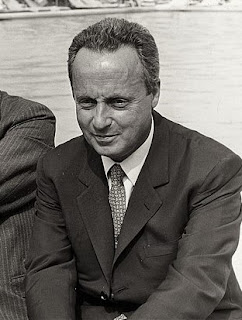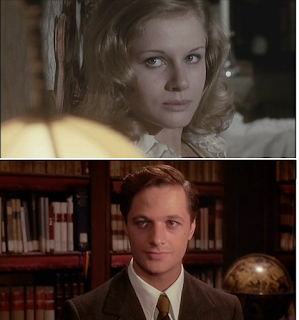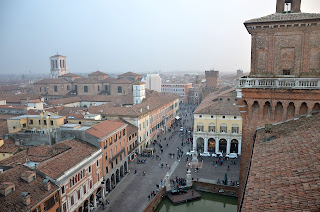Best-known work reflected plight of wealthy Jewish Italians in 1930s
 |
| Giorgio Bassani's novels drew on his own background in Ferrara |
Bassani’s best-known work, his 1962 novel Il giardino dei finzi-contini - The Garden of the Finzi-Continis - was turned into an Oscar-winning movie by the director Vittorio De Sica.
Like much of his fiction, The Garden of the Finzi-Continis is semi-autobiographical, drawing on his upbringing as a member of an upper middle-class Jewish family in Ferrara, the city in Emilia-Romagna, during the rise of Mussolini’s Fascists and the onset of World War Two.
Bassani, who was the editor of a number of literary journals and a respected screenplay writer, had already achieved recognition for his work through his Cinque storie ferraresi - Five Stories of Ferrara - which won the prestigious Strega Prize in 1956.
But it was The Garden of the Finzi-Continis that won him international acclaim. The novel was part of a series that expanded on the same theme in presenting a picture of the world during the author's formative years, against a background of state-promoted antisemitism.
The son of a doctor and an aspiring singer, Bassani was born in Bologna. His father, Angelo Enrico Bassani, had served with the Italian Army as a medical officer in World War One and was on furlough in Bologna, where his pregnant wife, Dora, joined him but went into labour during the visit.
They were both from Ferrara, where they returned after the war ended. Giorgio was named after the patron saint of the Po Valley city, on whose feast day his parents had become engaged.
 |
| Bassani's most famous novel is a Penguin Modern Classic |
There was wealth on both sides of the family. Their paternal grandfather had been a landowner and cloth merchant; their maternal grandfather was a professor of medicine and head of the main hospital in Ferrara, an expert in gastroenterology who was still working right up to his death, aged 99.
Yet the ambitions of all three siblings were thwarted by Mussolini’s anti-semitic Racial Laws. Giorgio, a talented pianist, completed his degree at the Faculty of Arts and Letters at the University of Bologna, but with Jews barred from most professions the only work he could find was as a teacher at the Jewish School in Via Vignatagliata.
Paolo hoped to become a doctor, like his father and grandfather, but with Jews barred from Italian universities, he was forced to go to France, where he studied engineering instead, before being expelled following the German invasion. Jenny became one of Giorgio’s pupils at the Jewish School but, with little prospect of making a career in Ferrara, fled to Florence.
It was while he was teaching, in 1940, that Bassani published his first novel, Una città di pianura - A City of the Plain - which he wrote under a pseudonym, Giacomo Marchi, so as to evade the race laws. It was around this time that he became a political activist, joining the anti-Fascist resistance. He was arrested in May 1943 but thankfully spent only a couple of months in jail, freed after Italy formally surrendered to the allies and Mussolini was arrested.
 |
| Dominique Sanda and Lino Capolicchio, stars of the film version of The Garden of the Finzi-Continis |
Bassani, too, drifted south to Rome, where his literary career gathered pace. As an editorial director of the publisher Feltrinelli, he was responsible for the posthumous publication of Giuseppe Tomasi di Lampedusa's novel Il Gattopardo - The Leopard. He published some poetry and short stories of his own before his Cinque storie ferraresi raised his profile following the award of the Premio Strega.
His 1958 novel, Gli occhiali d'oro - The Gold-Rimmed Spectacles, which was later also made into a film, examined the marginalisation of Jews and homosexuals and ultimately became the first in a series of books known as Il romanzo di Ferrara - the Ferrara Stories.
The Garden of the Finzi-Continis, which was one of the series, is narrated by a young middle-class Jew in the Italian city of Ferrara, who is fascinated with the Finzi-Continis, a wealthy Jewish family, and especially by their beautiful daughter Micòl, with whom he becomes infatuated.
The Finzi-Continis live in a lavish walled estate, which becomes a meeting place for other wealthy Jews, who find sanctuary there. The narrator - himself called Giorgio - finds his love for Micòl ultimately unrequited in a poignant portrait of a family and friends enjoying their final days of freedom before the horrors of the world outside the walls close in on them.
After Dietro la porta - Behind the Door (1964), L'airone - The Heron (1968) and L'odore del fieno - The Smell of May (1972) completed his series of Ferrara stories, Bassani wrote very little more in the way of fiction.
Estranged from his wife, he spent the final years of his life with his companion, Portia Prebys, an American-born professor of literature, whom he met in 1977. Suffering from Parkinson’s, Alzheimer’s and a heart complaint, he died in 2000 at the age of 84.
De Sica’s film of The Garden of the Finzi-Continis, which starred Lino Capolicchio as Giorgio and Dominique Sanda as Micòl, won the Academy Award for Best Foreign Language Film in 1972.
 |
| The centre of the city of Ferrara, looking down from the Castello Estense |
Ferrara is a city in Emilia-Romagna, about 50 km (31 miles) to the north-east of Bologna. It was ruled by the Este family between 1240 and 1598. Building work on the magnificent Este Castle in the centre of the city began in 1385 and it was added to and improved by successive rulers of Ferrara until the end of the Este line. The castle was purchased for 70,000 lire by the province of Ferrara in 1874 to be used as the headquarters of the Prefecture. Ferrara is also notable for Palazzo dei Diamanti, a palace in Corso Ercole I d’Este, that takes its name from the 8500 pointed diamond shaped stones that stud the façade, diamonds being an emblem of the Este family. It was designed by Biagio Rossetti and completed in 1503. The palace now houses the Pinacoteca Nazionale di Ferrara on its first floor.
Hotels in Ferrara by Booking.com
 |
| The bustling Via Giuseppe Mazzini is part of what used to be Ferrara's Ghetto |
Via Vignatagliata in Ferrara, where Giorgio Bassani found work as a teacher at the Jewish School - formerly at No 79 - is part of what used to be the city’s Jewish Ghetto, established in 1624, when about 1,500 Jews lived in Ferrara. Centrally situated, only about 500km (546 yards) from the Castello Estense, it remained open, on and off, until 1859, when it was permanently closed, although it remained the heart of the city’s Jewish community for many years afterwards. Criss-crossed by cobbled streets, the area maintains much of its structure and character. Its main street, Via Giuseppe Mazzini, which begins at Piazza della Cattedrale, is largely pedestrianised and has evolved into one of Ferrara’s main shopping streets.
Also on this day:
1678: The birth of composer Antonio Vivaldi
1848: The approval of the Albertine Statute, which became the basis for the Italian Constitution
1943: The birth of singer-songwriter Lucio Dalla